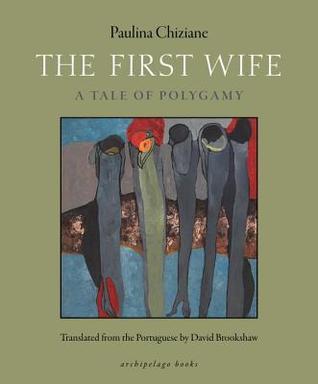The First Wife: A Tale of Polygamy by Paulina Chiziane (tr. David Brookshaw) was the last book I bought during WITMonth 2016, and I read it in early 2017. I neglected to review it, despite, unsurprisingly, finding it to be a fascinating and important novel. Let's ask ourselves, seriously, how I could not be interested by "the first Mozambican woman ever to publish a novel"? Or a novel that explores polygamy from the eyes of the wives?
I should begin, then, by noting that from a literary perspective The First Wife isn't necessarily the most brilliantly written text you'll ever read. There were times in which the writing felt a little flat, with certain passages dragging on just a bit longer than I might have otherwise preferred. It's far from a poorly written novel, but it's also... not quite the best.
The content makes up for it, though. This is far and away one of the more culturally fascinating books I've had the pleasure to read as a result of the women in translation project, in large part because it often feels as though The First Wife really isn't trying to talk to me, but within Chiziane's own cultural consciousness. I have found that I like these sorts of books more than those that try to "talk" to a foreign audience - Chiziane doesn't try to address "Western concerns" or questions about whether polygamy is good/bad. The First Wife instead works entirely within the assumption that polygamy is... just a thing. Not a great thing, undoubtedly, but main-character Rami plots the entire concept.
The story begins with Rami - the titular "first wife" - finding out that her husband Tony has been keeping not one, but four different mistresses for years. Each woman is progressively younger and typically more beautiful than the previous, stemming from a variety of ethnic backgrounds. Each woman is also deeply in love with Tony. But of course... they can't have him all the time. Under these circumstances, Rami sets out to force Tony to marry each of the mistresses and adopt a polygamous family under older traditions.
In this way, the novel fails to adhere to typical "Western" feminism. Rather than demonizing the subjugation of women (since of course the mistresses had had no legal claims before marriage...), there's an interesting exploration of what it means and how women find their strength within confining environments. Rami's initial fury over being duped turns into a fury over her husband's treatment of his various mistresses and children. Polygamy becomes a weapon not of the patriarchy against the women, but of the women against a man who seems to view them as meaningless and interchangeable in his life.
Slowly, over the course of the novel, each of the women - initially so emotionally and practically dependent on Tony - begin to change. Rami's "rivals" become more than just the younger mistresses of her husband, and she grows close with most. In her role as "the first wife", Rami exerts a great amount of control and influence over their lives, helping them achieve their ambitions and finding them stability (and indeed, sometimes love). In this way, The First Wife is able to display women's power in the places we assume women have none.
This, I think, is what makes The First Wife a uniquely feminist text. Chiziane is exploring what it means to be a woman, what it means to be women in a society that places them below men (Rami coolly refers to women's inferiority until the very end of the novel), and the ways in which women do find their voice, their strength, and sometimes their independence.


I read this just a few months ago! Fascinating novel.
ReplyDelete